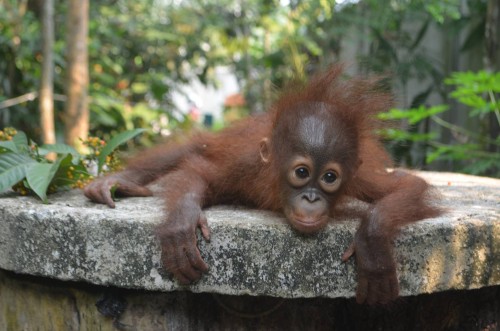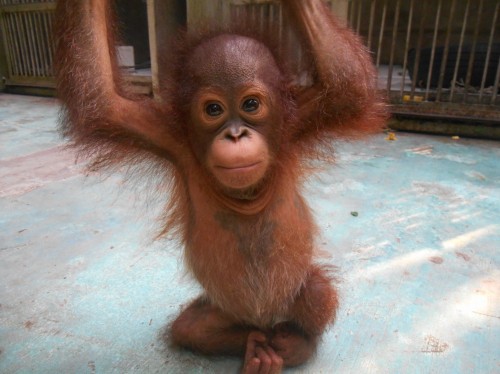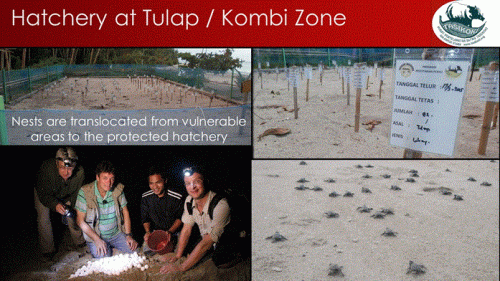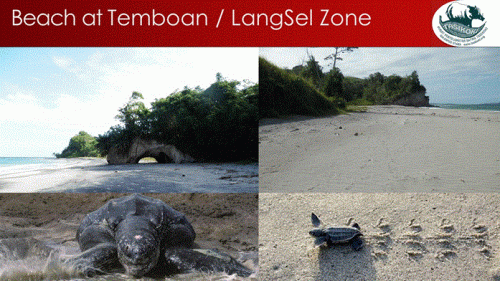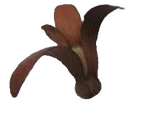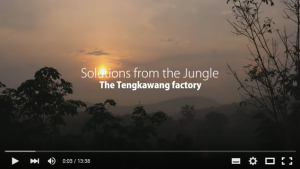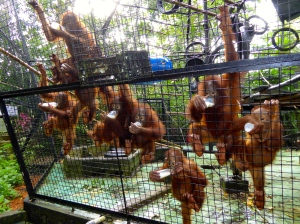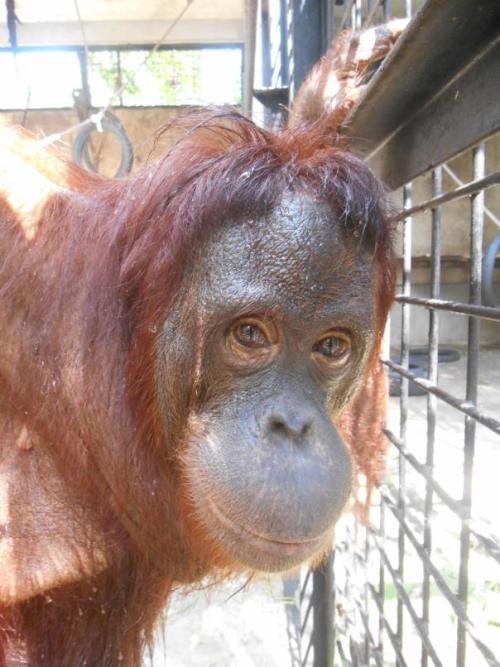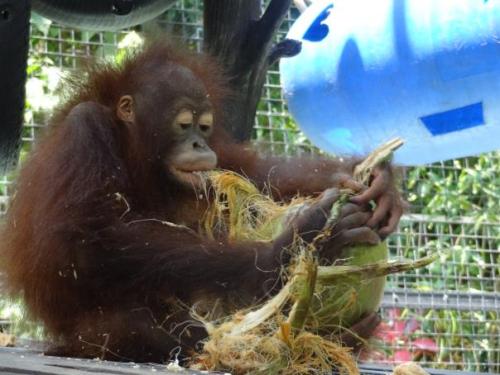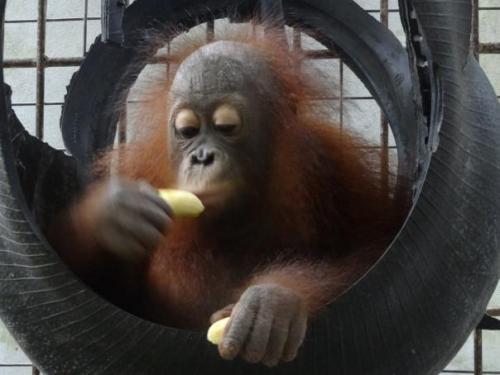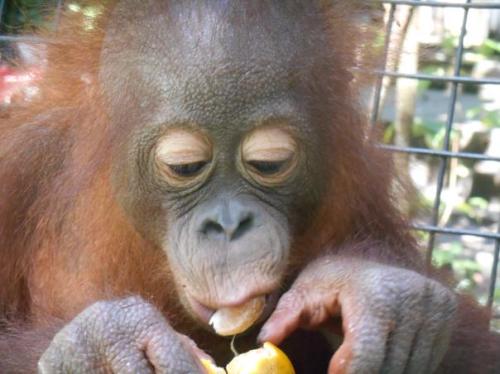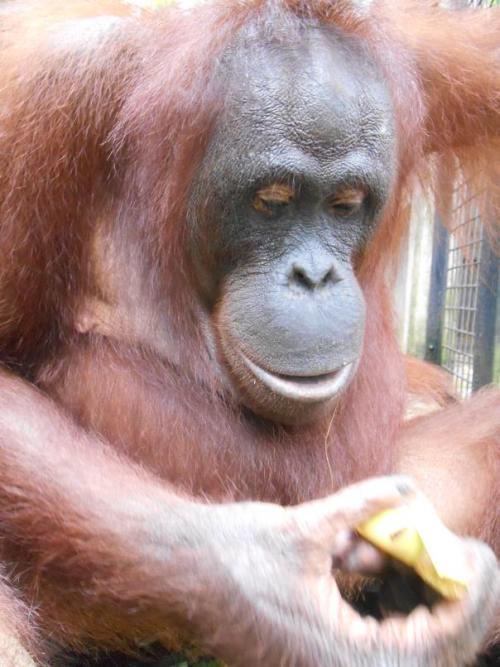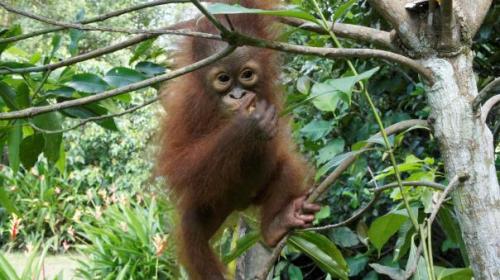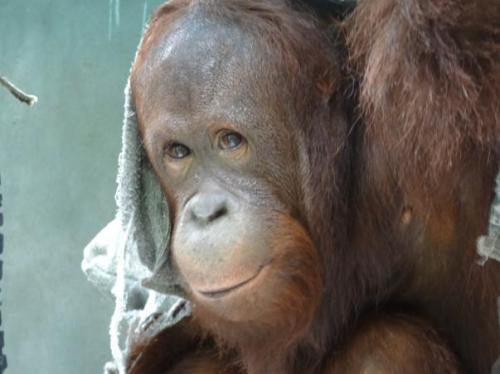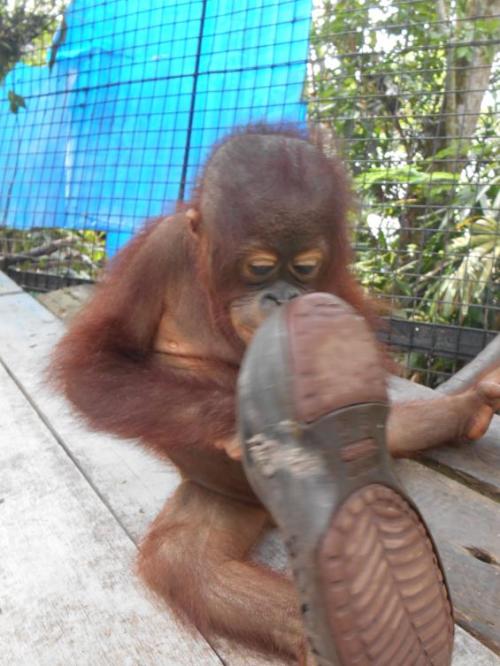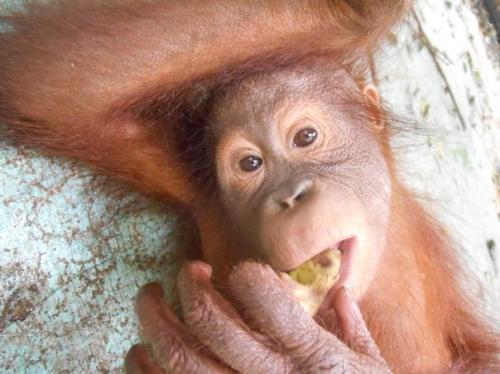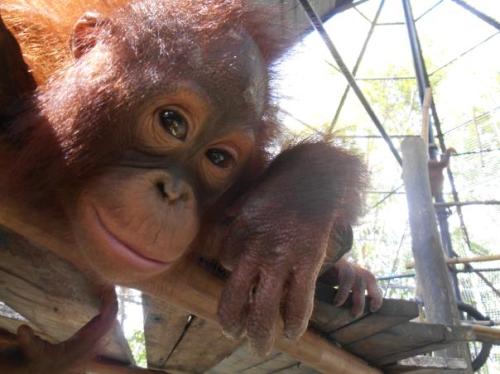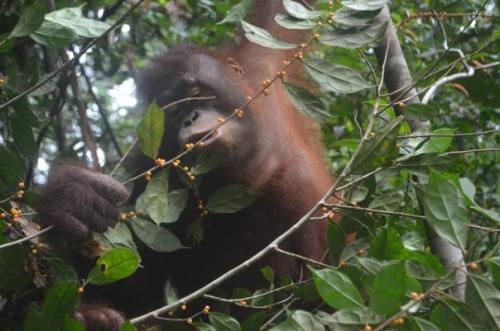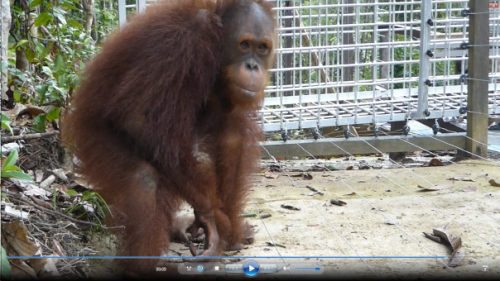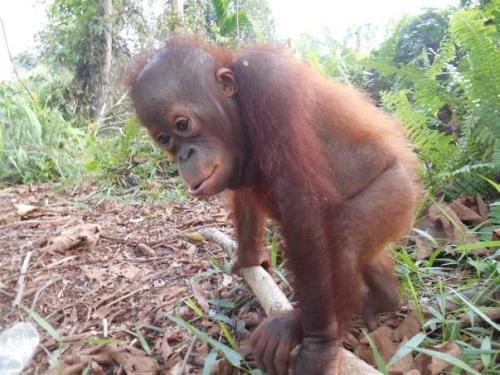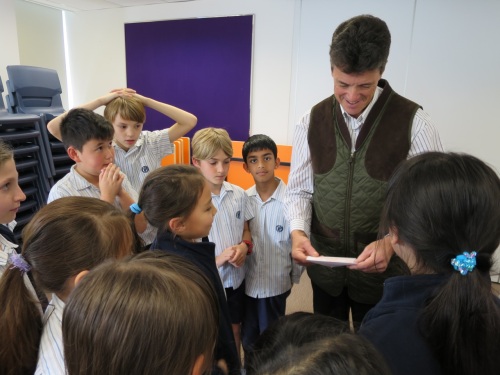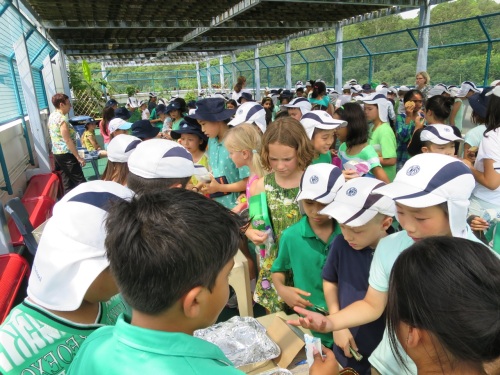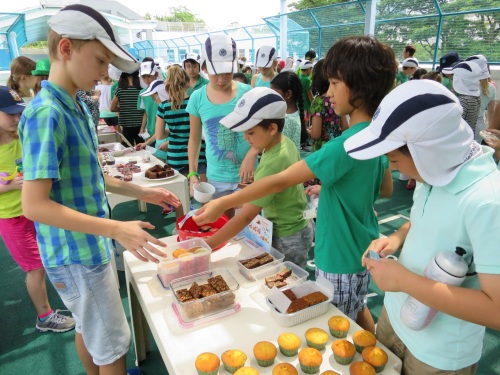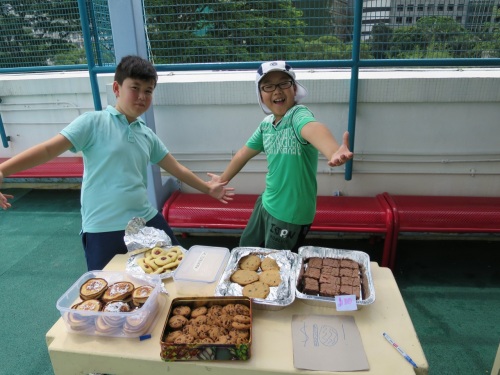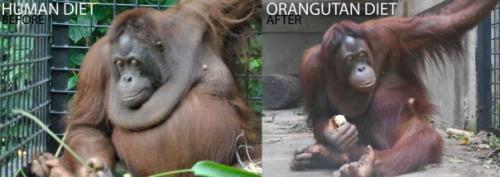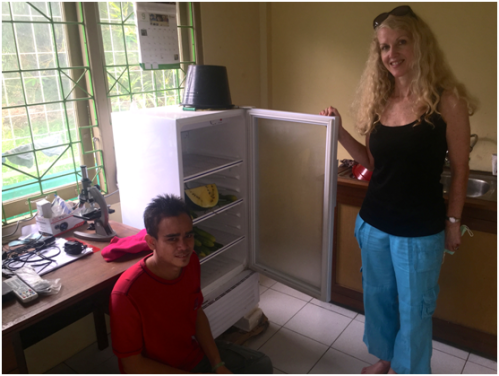 The fresh fruit fridge, that was sponsored by Masarang Hong Kong. With all the orangutans at the quarantine centre we need clean and healthy fruit to prepare them for the next stage in forest school. The fridge is very important therefore, especially for the smallest and most susceptible baby orangutans like Mona and Amin whom we recently rescued. On the left orangutan technician Bujang taking out fresh fruits for the orangutans, on the right Miss Adrienne Watson, chairman of Masarang Hong Kong, visiting the Sintang Orangutan Centre and bringing several donations for the project from Hong Kong. This fridge was bought a little earlier and Miss Watson was most pleased to see it being used well.
The fresh fruit fridge, that was sponsored by Masarang Hong Kong. With all the orangutans at the quarantine centre we need clean and healthy fruit to prepare them for the next stage in forest school. The fridge is very important therefore, especially for the smallest and most susceptible baby orangutans like Mona and Amin whom we recently rescued. On the left orangutan technician Bujang taking out fresh fruits for the orangutans, on the right Miss Adrienne Watson, chairman of Masarang Hong Kong, visiting the Sintang Orangutan Centre and bringing several donations for the project from Hong Kong. This fridge was bought a little earlier and Miss Watson was most pleased to see it being used well.
Sponsored fridge for the Sintang Orangutan Centre
Posted in Uncategorized
August, 2015: New Arrivals
Last month two new orang-utans arrived in our Sintang Orangutan Centre (SOC).
On the 17th of August a sweet and curious looking orangutan named Mona arrived. Mona is a small baby girl of around 9 months old. The previous ‘owner’ comes from a village close to Tembak. He told us that he had found Mona while hunting. He found her all on her own in the forest without her mother. He took her home, but Mona was so skinny that he was afraid she would not survive, so he brought her after 6 days to SOC. Well that is the official version, but we hear such stories all the time. More likely he played a part in the killing of Mona’s mother and when he brought the baby to the village other villagers warned him that it was illegal and that the village had promised to support conservation practices. Any way, in some way it is good that she was voluntarily handed over, in other ways how sad to have lost another reproductive female from the dwindling orang-utan population.
The second small orang-utan arrived on Friday 21st August. A little boy named Aming, between 1 and 2 years old. Aming had been kept illegally for over a month by a family in Nanga Pinoh, a village not far from Sintang. They bought him (not clear from the hunter or a trader), even though they were well aware of the fact that it is illegal to have an orang-utan. Probably after hearing comments from others they became afraid of the legal consequences, and therefore decided to hand Aming over to our orang-utan rehabilitation centre in Sintang. Aming looks quite healthy as far as we can see at first sight. However, he and Mona are getting thorough medical check-ups and will be treated by our capable medical team as needed.
We hope to soon tell you much more about these two little ones; how they are doing health wise as well as psychologically!
Thank you for your support!
The SOC Team
The Masarang HK Society Donation for Sea Turtle Project
 The Masarang HK Society received funds in 2015 from their work on the SCOLAR project. These funds (HKD140k) have been transferred to the Masarang Foundation in Indonesia to cover the operating costs of the sea turtle conservation work and to help develop the staffing of the project.
The Masarang HK Society received funds in 2015 from their work on the SCOLAR project. These funds (HKD140k) have been transferred to the Masarang Foundation in Indonesia to cover the operating costs of the sea turtle conservation work and to help develop the staffing of the project.
We are extremely grateful for the donation from Masarang HK Society. We would like to thank all those involved in the SCOLAR project, especially the Masarang HK volunteers, Chris Durbin, Ross Burrough and the staff from a number of primary and secondary schools in the English Schools Foundation, as well as staff from Discovery College and the Victoria Shanghai Academy.
The funds aim to cover the costs from 07-2015 to 06-2016 for the salaries of the 5 hatchery and patrol staff at Tulap, hire a sea turtle conservation officer (local university graduate) to manage all the activities within the project and expand to the new site at Temboan specifically for protection of the leatherback nesting grounds there.
The sea turtle conservation work is a project of the Masarang Foundation under management of Tasikoki Wildlife Rescue Centre. Activities started with volunteers in 2010 and will full-time staff since 03/2011. The project runs in collaboration with international sea turtle conservation experts, local community and local government. In 2013 the government declared the 30km coastline of Minahasa as an “Essential Ecosystem Area” for the protection of sea turtles and officially listed the Masarang Foundation as an NGO collaborator for this work.
Essential Ecosystem Area: Kombi zone
Due to the historically high amount of turtle and nest poaching at the beach near Tulap, the various activities have been carried out, including:
- Beach patrols to monitor the turtle activity
- Translocation of nests to protected hatchery for incubation under guard
- Talks about nature conservation with community leaders and local officials
- Overseas volunteers assisting patrols and contributing to the community
- Creating jobs in the community through the sea turtle conservation activities
- Education programmes in the schools in several villages in the surrounding area
- Supporting coastal communities with energy, water and sustainable agriculture activities in exchange for their commitment to sea turtle conservation
- Additionally, due to the high amount of household garbage on the beach, Community workshops on waste management have been carried out
Essential Ecosystem Area: LangSel zone
Temboan beach is quite remote, but still accessible by hunters and poachers via the village of Waleinsorit. As soon as we have adequate personnel on board, the following activities are planned for the beach area near Temboan:
- Beach patrols to monitor the turtle activity
- Protection of nests in-situ
- Talks about nature conservation with community leaders and local officials
- Overseas volunteers assisting patrols and contributing to the community
- Creating jobs in the community through the sea turtle conservation activities
- Education programmes in the schools in the surrounding villages
- Supporting coastal communities with relevant sustainable agriculture activities in exchange for their commitment to sea turtle conservation.
As a result of the donation, the core hatchery & patrol staff can be maintained for another year. This will enable us to save more endangered sea turtles. We are still seeking further funds for a number of initiatives for the sea turtle conservation work, such as:
- Hiring and training a local education officer from one of the nearby townships
- Building a small visitor/education centre at Tulap beach
- Building a small volunteer house near Tulap beach to be able to host overseas volunteers for the project
Please consider helping us by donating. We are always grateful for volunteers so if you would like to volunteer at the Tasikoki Centre, and save the turtles in person, please contact the Masarang HK Society volunteers and/or visit our website for more information: www.Tasikoki.org www.Masarang.HK
Posted in Uncategorized
The Tengkawang Jungle Factory
With the support of the Dutch Otter Foundation our Masarang Foundation built a small zero waste factory in the heart of Borneo. It makes use of local jungle products to provide energy, locally produced organic fertilizer and environmentally friendly pesticides, drying for agricultural products and improvement of income for local people without destroying the surrounding jungle. The system is based upon the fat from the Tengkawang nuts, better known as Illipe nuts and its valuable end product called Illipe Butter or Borneo Tallow. The factory was built in a remote village in Borneo and makes use of waste wood and Jatropha beans to provide all the sun based energy the village needs. There are a myriad of other solutions built into the system as well. Have fun watching how a local community takes its fate in its own hands while preserving nature. This is exactly what the mission and vision of our Masarang Foundation is about.
Posted in Uncategorized
Article from IOA Newsletter
Agarwood, IOA and Orang-utans
You may be surprised to know that agarwood can help save orang-utans, as well as empower local rural communities and protect rainforests; it can! 
After the recent IOA lecture given by agarwood expert, Mr Raymond Chu, at Professor Kans wonderful Imperial Museum, I was very proud to be asked to speak about the aims and projects of the local charity that I helped found, Masarang HK, namely to protect endangered Asian species, prevent deforestation and empower local rural communities.

Mr Chu’s lecture at the delightful Imperial Museum was most interesting and informative. Additionally, after the lecture he also took the time to give advice about how Masarang HK could help improve the agarwood projects of the communities we support in Indonesia, especially the Dayak communities in the Sintang region. We are helping to enable them to preserve the rainforest, including areas with agarwood, and encouraging them to protect the endangered species living in the region.
Presently we have rescued 27 orang-utans in Sintang, including ten babies. We hope that after rehabilitation in the Sintang Orang-utan Centre, we will be able to release them into these protected forest havens.
Therefore, agarwood can help us empower rural communities and help allow them to protect their forests and also allow a safe haven for endangered rainforest species, especially orang-utans, the only great ape in Asia.
We hope that we will now be able to find fair buyers for their agarwood, as this will help support the community to save their rainforest and result in a safe home for all our rescued orang-utans!
Thank you very much IOA, Mr Raymond Chu and Professor Kan for the opportunity to raise awareness about Masarang HK and the projects we support in the Sintang region.
These lovely baby orphan orang-utans are depending upon us!
To find out more about our work, please go to: www.Masarang.HK
For all orangutan lovers, please click on the SOC menu to read the latest newsletter update from the Sintang Orangutan Centre.
Posted in Sintang Orangutan Center (SOC)
NEWSLETTER 2015 : Latest News About Orangutan at SOC
LATEST NEWS ABOUT THE ORANGUTANS AT SOC (SINTANG)
Dear Supporters and Readers. Please have a look at the latest pictures and updates of the orangutans in the care of SOC (the Sintang Orangutan Center). Sintang is the capital of a district in the heart of Borneo and it is here where the rescue and q1uarantine center is located. When the orangutans are healthy and large enough they move to the forest school in the village named Tembak. This original Dayak village is located next to the Saran forest and the villagers have given the project some 150 acres of jungle right next to their village to use for training orangutans to become wild again. From this fenced forest area they are moved to their permanent forest home in the Saran forest. Each and every orangutan is unique and deserves to be saved. The stories you can read beneath give you the latest July 2015 situation of the orangutans in the rescue center and forest school. One really gets a good feel for the different personalities reading their personal stories. We hope you will support us in helping these unique beings, all orphans, to get a second chance for life in their forest jungle home.
Masarang Hong Kong welcomes your inquiries!
=========================
AGUNG
Agung is very quiet and also very skinny and small for his age. His size can be attributed to severe malnutrition when he was younger. Although ‘agung’ means ‘the greatest’ in Indonesian, the other orang-utans do not seem to know this as Agung often gets bullied.
He gets a wide range of food from us to give him the opportunity to experience different food every day. However, he does not like many kinds of food. He mainly eats bananas and sometimes papaya and oranges, which we therefore give him in large quantities.
With love and care, as well as more appetite for a wider variety of food, we are hopeful that Agung will make steady improvement.
=========================
BABLU
Although Bablu still has difficulties establishing good relationships with the staff, she does however like it when our vet, Vicktor, pulls out her chin hairs one by one. Her previous owners used to do that because Bablu enjoyed it! We do not aim to have orang-utans be friendly with people; however, it is important that they have a good relationship with their caretakers. Bablu’s behaviour can be very unpredictable; sometimes she has a good day and sometimes she has a bad day. This, of course, is not restricted to only orang-utans, as we all know!
=========================
BEMBI
Bembi is doing very well in the socialisation enclosures. This is not really surprising because she is such an extraordinarily clever young female. Before, she was spending most of her time with Tanjung and Penai, but she is now swapping enclosures on a regular basis. This way she gets to interact with a bigger variety of orang-utans. She can even be in the same enclosure as moody Bablu! Although they do not really play with each other; the two ladies give each other enough space when eating and never fight.
Bembi also gets along with Agung very well. Agung gets easily dominated by other orang-utans, but Bembi is a similar size to Agung. It is good to see them treat each other as equals.
Bembi’s new best friend is Molly, who is around the same age. Together they are the youngest of the juvenile group, but are both doing very well.
Recently when the orangutans got their daily browse/nesting material, Bembi started attempting to sort the leaves into something that was supposed to become a nest; however, she looked confused whilst doing so. One of our staff started helping her by showing her how to make a nest, similar to a bed. Bembi watched with full attention how Vicktor structured her leaves and after he had finished, she immediately laid down on her freshly prepared bed! As mentioned earlier, she is very smart and can even get others to make her bed for her!
Bembi is not only good at social skills, interacting wonderfully with any other orang-utans, but she is also extremely aware of complicated situations. For instance once when Jessy, our baby caretaker was sitting with Terra in the large baby socialization enclosure, Bembi stood in front of Jessy and whined while every time moving her eyes from Jessy to a place above her. When Jessy looked up she saw the snake!
=========================
CEMONG
Cemong is a very strong climber. Recently Cemong was released into the trees at around nine and did not come down until 4 pm. She has fantastic endurance, climbs to great heights and shows skilful climbing techniques allowing her to climb easily from one canopy to another. It is wonderful to see how she truly feels at home high up in the branches.
=========================
DORA
Dora unfortunately still has some troubles with her intestines, and is therefore still in the quarantine enclosures. She used to call often for attention when staff passed by, but we are happy to see that she feels more at home now and that she calls less for attention.
We hope that she will recover soon and join the other babies in the enclosure.
=========================
GAGAS
It is important that the orangutans learn to like a large variety of food before being released into the wild as this increases their chances of survival. The larger the variety of food an orangutan eats, the greater their chances are of finding food in the forest. This increases the chances of an orangutan finding sufficient food sources in times when food is scarce.
Gagas’ appreciation of different fruits and vegetables is not quite large enough; however, there is one that is his utmost favourite, the ‘buahbenggkowang’ (a kind of potato or turnip-like vegetable). When he spots ‘buahbenggkowang’ he immediately drops whatever other food he has in his hand at the time and runs for this one.
He is making very good progress and improving his forest survival skills every day.
=========================
IGA
Orangutans should have an understanding of things in the forest that are dangerous or unpleasant. Some ants for example can bite, although others are not harmful at all. The fact that bees sting is also another thing that some orangutans learn the hard way, namely by trial and error.
Some of the orangutans are scared of bees whilst others are not. Some first need to meet and greet bees before they understand that a bee can sting and that this is not a particularly pleasant experience. Joy once came down the trees with a face full of inflamed lumps caused by bee stings. Jojo had a similar experience and the next time she came across something that resembled a beehive she started banging it with a stick. It appears that she did not know the difference then between a beehive and similar looking objects, as this time it was just something similar to a beehive she was banging.
When Iga recently discovered a beehive, she also started banging it to get the bees out. Orangutans bang small beehives not because they are angry or scared but to chase the bees out. Without the bees in the hive they can get to the honey, without being bothered by stinging bees.
Iga is also doing well and learning day-by-day to be a successful, safe orang-utan. She already is smart!
=========================
INUL
We had lobbied for a long time for the Ministry of Forestry to close down a ‘zoo’ where so much wildlife had perished. Inul used to share the cage in that ‘zoo’ with Cuplis, a male orang-utan. They were kept in the full sun with no shade and were surrounded by garbage and their own waste. Cuplis died in that enclosure. We were very pleased that our lobbying was successful and Inul is doing well at our Sintang Centre.
Inul instantly recognized Willie the first moment she saw him at our orang-utan centre. She had previously seen him three years before when he visited her and Cuplis in the horrible ‘zoo’ in the hope of getting her and Cuplis released. Orangutans have much better memories than humans!
Inul had a lot of parasites when she was first brought to SOC, but she is now a healthy young lady again. She is now very much at ease and seems to really enjoy her very much improved life.
=========================
JAMILAH
Jamilah is very particular about which humans she likes. However, with Willie she is the sweetest girl, always asking for a nice hand massage or some gentle scratching behind her left ear.
Jamilah is an example of one that does not like it when people watch when she has to move to another enclosure for cleaning. When the staff closes the gate she is always a bit irritated. She does not like people easily and has very particular preferences amongst the staff. Only Adang and can clean the enclosure while Jamilah is present. When the other staff members attempt to do it that way, Jamilah lets them know she is not amused by their visit and grabs the cleaning equipment away from them.
=========================
JUVI
Juvi has discovered a new game with the keepers. She comes to the front of the enclosure and actively tries to challenge Eko and Vicktor to come to the enclosure to chase her. When they playfully approach the enclosure, Juvi happily runs away. When the keepers pretend they leave, she tries to lure them to play the game over again.
She is doing well and we hope that she will continue to make good progress.
=========================
MAYA
Maya is one of our new babies. She recently got a new playmate, called Selly. They are both around one and a half years old, which makes them the youngest of all the babies at SOC. Therefore they are put together in one enclosure, so they will not get bullied by the older babies.
Maya is a bit more scared than Selly and she is very careful when climbing. When Maya and Selly go to the forest with the keepers, she needs more time to climb from the keepers to the tree. First she just clings on the keeper. Soon she dares to grab a branch with two hands and one foot, although one hand is still holding onto the keeper’s shirt. After a bit more time and she is brave enough to let go of the keeper and explore the trees on her own. However, she remains very close to the keepers, like wild orang-utans would stay close to their mothers at this age.
=========================
MATUARI
Matuari once tried to test his strength against Willie in a play wrestling game, when Willie was in the enclosure. Since then he always goes to the farthest end of the facility when Willie passes by. Orangutans have an excellent memory!
=========================
MOLLY
Molly is finding her way in the socialisation enclosures. Her best friend is Bembi. The two are the youngest of this group.
=========================
MUNGKI
Orangutans often have their own way of attracting attention. Penai hangs her hands out of the enclosure and starts clapping them, others sometimes try to spit, throw or wave with a twig and some blow raspberries! Mungki also has his own way. He blows on the back of his hand, resulting in a loud raspberry-like sound.
Mungki is doing very well in the socialisation cages, and is getting along with more and more orang-utans. He can be a bit dominant and aggressive at times when it comes to food, however he can even be paired with our sensitive girl,Penai, without there being any problems. He really likes Penai and occasionally tries to hug her, although Penai prefers just being friends without the hugging part.
=========================
OLI
Oli is currently in the baby enclosure, although he is not a baby anymore. However, he is already the most dominant individual in this group. In the near future we will see with whom he can be matched in the juvenile group.
Because of malnutrition when he was younger, he is not of equal strength to the other juveniles. In addition he has a paralysed leg, which also makes him less mobile.
We know of many other orang-utans that have had good lives with just three usable limbs and Oli does use the knee of his broken leg for climbing, so we are hopeful that he will continue to make good progress and be successful in the future.
=========================
OSCAR
Oscar does not seem to be scared of anything and is always willing to try new things. It is wonderful to see how Oscar now has a fun and carefree life, after a previously terrible beginning. His mother was killed in front of him and he was kept in captivity afterwards.
When we take Oscar to the forest, his real talent shows! He can already eat dozens of food types in the jungle! He eats termites, many kinds of forest fruits, young leaves and twigs, thorny rattan fruits, shoots from ginger growing on the forest floor, as well as young shoots of orchids. Many of the babies have to be taught what is safe to eat, but Oscar’s ability to know what to eat is simply amazing!
He also is a risk taker. He loves to swing from branches and lets himself fall on purpose. We hope he will soon learn to be more careful out there in the forest!
=========================
PENAI
When Penai arrived at the Centre, she was ill and emaciated. The forestry police had taken her from a restaurant in Nanga Pinoh and they thought she was close to death. Luckily, Doctor Sri treated her and now she is seldom sick after the wonderful care and good food.
Penai is very popular with the guys. Matuari and Mungki are often trying to get Penai’s attention. Mungki tries to hug her now and then, but she does not show much interest in his hugging attempts. However she does seem to be happy with Matuari’s attentions!
Unfortunately we cannot let Matuari and Penai spend much time together since Penai has reached the maturity level when she can get pregnant. Of course, we want her to have babies and become a great mother in the future. However, we hope even more that she could raise her young in the wild. It is true that pregnancy during the rehabilitation process could give us the opportunity to help her in her motherhood. However, for the baby, it would be better to not have lived in captivity at all (even though it is a rescue and rehabilitation centre).
=========================
RIBANG
Ribang is always up to something, exploring his way around. A boot is nice on your feet, but what about as a lovely hat?
Ribang has now gained a lot of confidence from his “Boys Club”. He likes to gang up with Oscar, Oli and Gagas in the enclosure to occupy the best position to get the morning bottles of milk first. They are the ‘greedy bunch’ and support each other.
His increasing taste for a wider variety of foods have helped him gain weight and that has probably also helped him to gain more confidence, as can be seen from his little cheek pads that always indicate naughty and outgoing character in juvenile and baby orang-utans.
=========================
PUTRI TANJUNG
PutriTanjung means in Indonesian princess of the island.
=========================
TERRA
We were really worried about Terra when she first came to the centre, since she was so traumatized but, wow, did she come out of that fearful and shy condition! Now she gained herself even the nickname “bite-y girl”!
Terra often has a funny funky hairstyle where her hair points straight up from her head to the sky.
=========================
SELLY
Selly started her rehabilitation at SOC in Tembak first, because she was evacuated from a village very close to Tembak. Although we are planning to take more babies to Tembak in the near future, we took Selly to Sintang. The reason for this is that she is one of the smaller babies and the babies that will go to Tembak, will be the older ones. To prevent bullying by older ones, Selly is happiest matched with her peers, like Maya. These two little girls often go to the baby forest school together. Selly is a good climber, and the braver and more explorative of the two.
As soon as we have enough funding for baby enclosures in Tembak, we will arrange various baby age groups to stay together in these enclosures in Tembak.
=========================
VIKO
Viko is a gentle girl and more often afraid of things. During her first introduction in the baby enclosure she held on to the keepers for a long period of time. While the other babies were very interested in their new playmate and started to explore their new friends, she would not let go of the keeper.
She is now making great progression with the other babies, and often hanging more in the background and playing and exploring the world quietly by herself. We are also happy to see that she is not showing stress symptoms as before when she suffered repetitive stress syndrome where she rocked her body repetitively.
When our new orang-utan baby keeper, Tri, started cleaning the enclosure, it was Viko who liked to hold her hand while she was cleaning their cage.
LATEST NEWS ABOUT THE ORANGUTANS AT SOC (TEMBAK)
Tembak is the name of the village where our forest school is located. The villagers have donated approximately 60 hectares of virgin forest to be used for the orang-utans. We have started fencing in the area so that orang-utans that are getting bigger and more ready for the permanent release near Tembak. We do not want them to have any contact with local people, neither do we want local people getting disturbed by adventurous orang-utans venturing into their gardens. We have taken the first five orang-utans to Tembak and these are now living successfully in the Tembak forest.
=========================
JOJO
The new night enclosure in Tembak is finished for Jojo & Momo and a few more orangutans that are currently in Sintang. Jojo & Momo have already been moved and seem very happy in this new place.
Jojo is now almost back home. Literally, since she originally was caught in the nearby forests and handed over by the Tembak village to our project. Now she lives there again but is loved, protected and has a much brighter future for herself and her offspring.
Soon other orangutans will also be moved to Tembak. The fence is completely finished and we will soon ask the Chief of the Forestry Ministry to invite the Minister to officially welcome the orangutans to Tembak.
=========================
BENO
The electric fence is finished and Beno was the second who was let in the forest enclosure with the new fence. Of course everything that is new is interesting and should therefore be explored. Although not a nice experience, Beno still tried to touch the fence a few times. After those few times he decided it would be best just to keep the fence as it is and stay away from it. He now knows he can just play in the forest, but should keep a distance from the fence!
=========================
MAMAT
Mamat was the first who could try the electric fence. This new installation had to be explored and as a part of this exploration Mamat chose to touch it. Surprised by the rather unpleasant feeling of the shock of the fence, he still was tempted to touch it again, because this was probably the first time he experienced something like that. After a few times of touching and surprised by the feeling, he now understands the fence is something you should leave alone and just use your energy climbing trees. This would be useful, as he certainly needs his climbing skills to improve.
His muscles are not well developed yet, due to the severe conditions he used to live in. Whilst being confined to a tiny cage and being dramatically malnourished, his muscles were so cramped that he could not even move his limbs or open his hands. It took a year of care and physical therapy before he could use his limbs again properly. As a result, his underdeveloped muscles do not make it easy for him to catch up with the other orangutans in the forest. It requires a lot more effort for him to climb and this can be very frustrating for him. He does come up with new ways of climbing though, sometimes he uses his chin against the tree to climb up! Where there is a will, there is a way.
We do have some concerns that Mamat’s eyesight might have been affected by the long period of malnutrition. Although we cannot be sure he will make it back to the jungle as an independent orang-utan, he has made an amazing recovery and is enjoying life in the forest again at forest school.
=========================
JOY
Prior to being rescued, Joy had been tied by a chain on a garbage dump along a small road near Nanga Pinoh and was heavily burned by being left in the sun without shade.
She is making good progress and we are very pleased that Joy is really good at finding food in the jungle. She clearly remembers things from the time she was still with her mother since some of the things she is eating we did not even know are suitable for orang-utans!
When baby Selly was still based in Tembak, Joy was very interested in her. Very gently she would approach Selly and play with her together in the forest. Once when they were climbing the trees together, Joy took her hand to help her climb over to another tree. Joy was a bit like Selly’s big sister in the forest.
========================
MOMO
Momo is as naughty as ever and likes to play with our biologist’s shirts.
You can clearly see from his eyes and cheekpads that he is a superconfident fellow. Fortunately he is willing to come along with a few of our senior orangutan keepers, but he is growing fast in size and strength and his rough play is a bit of a concern. We need to bring a few of the other orang-utans from Sintang to Tembak to show Momo he is not the ‘King of the Jungle’!
Momo & Jojo have been moved to the newly- built enclosure in Tembak. This enclosure has a tunnel connecting it to the forest. The orang-utans will then be able to go in the forest independently from people.
The third article in the orangutan-a-week series is about Ribang a lovely baby boy Orangutan .
Masarang Funds for dedicated SOC Team
Masarang HK is very grateful for all the help and support we receive.
Recent donations have been sent to Tasikoki and to the Sintang Orangutan Centre.
The funds we sent to the Sintang Orangutan project were used to provide the annual salary for two trained and dedicated veterinary nurses, as well as help support the work of Dr Viktor, the delightful and caring veterinarian. We also sent the funds for a refrigerator for the clinic.
Thank you to all those who helped us help them.
Please read the article below to find out more about the work of these three members of the dedicated SOC team.
Drh. VICKTOR VERNANDES NAINGGOLAN

Vicktor is our vet, as well as manager. He was originally from Sintang but did his veterinarian studies at the Gadjah Mada University, which is a well-known university in Jogjakarta on Java.
He has been working with us for almost two years. He came to SOC because he has a great desire to help in primate conservation. He loves his work at SOC. He is part of a super team with a lot of young people who all have the same spirit: to fight for the conservation of the orang-utan; and, to release them back to the wild as soon as possible.
Although he loves all orangutans, Joy has a special place in his heart. This was the first orangutan that arrived at SOC after he started working here. Joy was very stressed at that time and Vicktor spent lots of time comforting and caring for her. He became someone she could trust and a friend whom she could love and trust.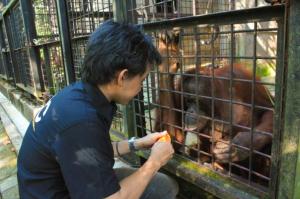
=================================================

“I wish all of us at SOC will be able to rescue, rehabilitate and release many more orangutans and give them their deserved freedom in the forest.”
HOEI BAYU KURNIAWAN, Amd.
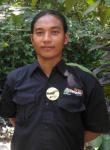 Bayu has worked for over 9 months at SOC as a veterianary nurse. He was born and raised in Jogjakarta and studied at the same university as Dr. Vicktor and another of our staff, Eko. Bayu and Vicktor have known each other from outdoor activities at university in Jogjakarta when they did a lot of hikes and field trips together.
Bayu has worked for over 9 months at SOC as a veterianary nurse. He was born and raised in Jogjakarta and studied at the same university as Dr. Vicktor and another of our staff, Eko. Bayu and Vicktor have known each other from outdoor activities at university in Jogjakarta when they did a lot of hikes and field trips together.
Bayu is very eager to understand everything about orangutans. He enjoys learning every orangutan’s special and unique character. He loves how the orangutans can teach him new things about their forest and how he in turn can teach the orangutans new things, such as introducing new food to them.
Bayu is a great member of the SOC team, working together to ensure the best care for the orang-utans, helping them to recover and eventually to live free and safe in the wild again. 
=================================================
EKO SIDIQ MUSTOFA, Amd.
 Eko is the latest addition to the team. He is a veterinary nurse and has worked at SOC for 3 months now. He was born and raised in Jogjakarta where he also studied to become a vet nurse at the Gadjah Mada University.
Eko is the latest addition to the team. He is a veterinary nurse and has worked at SOC for 3 months now. He was born and raised in Jogjakarta where he also studied to become a vet nurse at the Gadjah Mada University.
He joined SOC because he wanted to fight for the rights of orangutans and other Indonesian wildlife to be able to live in freedom. Eko has a very happy spirit and is always smiling and ready to laugh.
He loves his work at SOC and the team he works with, as they have all become good friends.
Eko is fascinated by the enormous intelligence of orangutans and the way they behave when eating, sleeping and playing with each other. He has been fascinated to learn how orangutans get your attention to communicate their desire, for example, the way they ask for the food you are holding in your hand by throwing twigs, making a sound or clapping their hands.
=================================================
Please find photos of the three of them together in the surgery room at our clinic while taking care of an orang-utan. 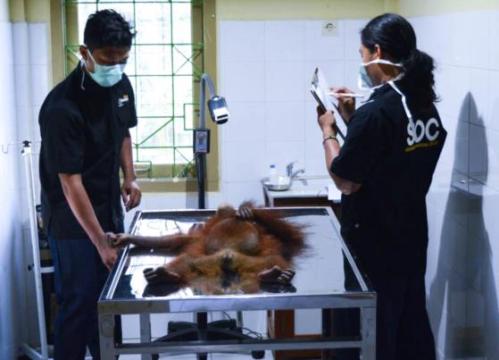
‘Thank you for the support from the SOC Team’
Posted in Uncategorized
CWBS Raises Awareness and Funds to Support Masarang Foundation
CWBS Pupil Donation
Carina, a Year 4 student at Clearwater Bay School, felt really worried when she heard that her favourite animals, orangutans, were being threatened by the destruction of their habitat and were being mistreated by humans. After hearing about the work the Masarang Foundation is doing, she decided that she wanted to help. Carina managed to raise a fantastic $500 by completing chores around the house. She was really happy to meet with Dr Smits and have the opportunity to hand the funds she had raised to him personally.
CWBS Bake Sale
As part of the school’s ‘Green Week’ at the end of May, the 22 Eco-Warriors at Clearwater Bay School decided to hold a craft and bake sale to raise funds to support the work of the Masarang Foundation. The children worked really hard using recycled materials to create some beautiful craft items, which included woven bags, envelopes and pencil pots. They also baked some delicious cakes and cookies to sell. The event was a huge success and every item was sold! We managed to raise $7715.30, which we hope will help the Masarang Foundation continue all the great work it is doing.
Posted in Uncategorized
Bablu: Second in the ‘Orangutan-a-Week’ Series
Many of the older orang-utans at the Sintang facility had been illegally kept for years by their ‘owners’. They require a great deal of rehabilitation.
The care and rehabilitation of adult orang-utans is not easy. However, we strive to rescue as many as we can, give them the best rehabilitation possible and ensure they have the chance at a natural orang-utan life in the forest.
The second in our series of articles on orang-utans at the Sintang centre is about one of the older female orang-utans at the centre, namely Bablu.
Bablu came to SOC 13 months ago (8th May 2014). When she arrived she was very overweight, due to the unhealthy food she had been given, such as soda, chocolate milk, pudding and noodles. In the beginning she did not like normal orang-utan food and would not eat it, except very sweet fruit, like mango.
However, now she already eats a lot of vegetables and fruit and has lost many kilograms by sticking to this ‘proper’ orang-utan diet. Also please notice in the pictures above how dull and unhealthy Bablu’s hair looked when she arrived (image on the left) and how shiny and thicker it now is (image on the right)
Bablu was not the friendliest orang-utan to the others when she first arrived, but she is now getting less grumpy. She gets along much better with Juvi and Matuari. When Matuari , one of the young males, is moved into the enclosure with Bablu, she actually seems rather exited, which makes her a lot more active than she usually is. We are very pleased to see that! The more exercise the better in Bablu’s case and the attentions of a young, attractive male seem to be working wonders with her attitude!
Previously, when Bablu received enrichment she did not understand what it was or what to do with it and was not very excited to find out what it was either. However, now she plays and explores it and sometimes even finds the ‘surprise’ inside. The surprise is often a healthy, wholesome snack!
Learning to become an orang-utan again is not always easy. Bablu has her moods and is rather unpredictable, but we love and care for her and hope she will be ready to adapt to the life in the forest soon.
Please help us, help her.
The SOC Team
